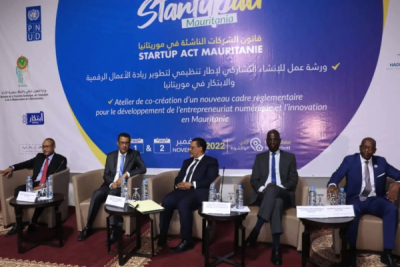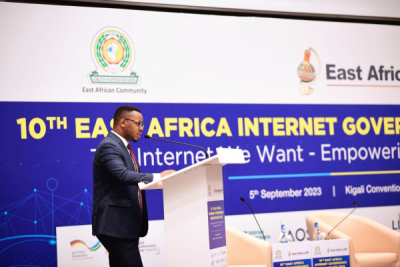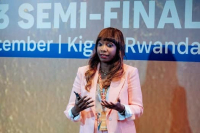
Public Management (483)
Information and communication technologies have become key drivers for efficiency and growth in several economic sectors. Realizing the importance of such technologies, Cameroon is stepping up initiatives in the digital sector. The government recently launched a major project to rapidly develop the sector.
On Friday, September 15, Cameroon’s State Minister Ferdinand Ngoh Ngoh granted an audience to a delegation of Chinese tech giant Huawei. According to local media, during the audience, the two parties discussed a range of topics, including the development of the digital sector in Cameroon.
"Given Cameroon's potential, Huawei Group officials reaffirmed their commitment to working alongside the country to develop a high-level national strategy for the digital economy, to make Cameroon an ICT hub in the French-speaking African region," reports the state-owned daily Cameroon Tribune.
The technology group's visit to Cameroon comes a month after the launch of the Project for the Acceleration of Digital Transformation in Cameroon (PATNUC). The project, financed to the tune of $100 million by the World Bank, is designed to accelerate the country's digital transformation through three main complementary components on the supply and demand sides of the digital economy, with a particular focus on digitizing the agricultural sector.
Thanks to this mutual commitment, Cameroon will be able to benefit from Huawei's technological advances and expertise to strengthen its digital sector and foster economic development. The two parties will also be working together to transfer ICT technology to Cameroon's youth, as well as promote rural electrification using solar energy and develop the concept of smart cities using video surveillance at the national level.
Samira Njoya
In Africa, governments are gradually adopting tech solutions to address document fraud, identity theft, terrorism, and cybercrime as well as upgrade to international standards.
The Federal Republic of Somalia will start issuing biometric identity cards to its citizens. On Sunday, September 17, on the sidelines of a conference organized in Mogadishu by the National Identification and Registration Authority (NIRA), Prime Minister Hamza Abdi Barre inaugurated the Somali National Identification System (SNIDS).
Designed with the help of a multi-million dollar grant from Pakistan, the new system aims to provide Somalis with a secure and universally recognized form of identification.
The SNIDS digital solution was developed by NIRA in partnership with NADRA, Pakistan's National Database and Registration Authority. It is the result of a partnership signed by the two institutions in 2017. It aims to issue identity cards to at least 15 million Somalis, including children, by 2026. It is in line with "ID4Africa", a movement that aims to provide all Africans with a digital identity by 2030.
The system will assign a unique identification number (NIU) based on demographic and biometric data to any individual of Somali nationality or resident in Somalia. According to the Prime Minister, this identity number will serve as an identification document for each individual until his or her death. This data, together with the NIU, will make it possible to set up a central, secure, and reliable database that will serve as a reference for verifying the identity of beneficiaries of public, private, or social services.
"NADRA takes immense pride in the successful execution and launch of Somalia's National Identification System. This achievement reinforces Pakistan’s vision for a more secure and prosperous Somalia, where every citizen has access to reliable identification. The National ID System will not only bolster security but also pave the way for inclusive development, financial empowerment, and improved governance," said NADRA Chairman Asad Rehman Gilani.
Samira Njoya
Over the past few years, digital adoption and digitization have grown steadily across Africa. Well aware of the importance of that digital sector for the development of several sectors, Morocco is stepping up efforts to fully capitalize on the opportunities offered.
On Friday, September 15 in Rabat, the Moroccan Ministry of Digital Transition and Administrative Reform (MTNRA) and the German International Development Cooperation Agency (GIZ) signed two partnership agreements. The agreements aim to promote digital transformation of the public administration and the digital inclusion of very small and medium-sized enterprises (VSEs) and small and medium-sized enterprises (SMEs) in Morocco.
The first agreement, worth 3 million euros, will run for 3 years. It aims to support public agencies and institutions in their efforts to modernize services offered to citizens.
The second partnership, valued at 5 million euros, is dedicated to enhancing the technical and organizational capabilities of institutional stakeholders committed to promoting digital inclusion among SMEs. This initiative will oversee the development of mechanisms designed to lower transaction costs for service providers, ensuring the seamless digitization of SMEs and bolstering their capacity to leverage tailored services for their digital transformation. This agreement will be in effect for 4 years.
The new agreements complement several others recently signed with major national and international tech companies to promote the digital sector in Morocco. They are in line with Maroc Digital 2020– Now Maroc Digital 2025– that sets digital transformation of the public administration as one of its key focuses.
According to Ghita Mezzour (photo, center), the Minister Delegate in charge of Digital Transition and Administrative Reform, modernizing the administration is one of the Ministry's biggest projects, as it strives to increase efficiency and performance, and make administrative procedures and processes more transparent and accessible, in line with directives of the King of Morrocco.
Tanzania aims to become one of the leaders in the digital sector in Africa. To achieve this goal, the executive is focused on building a strong digital infrastructure.
The Tanzanian government is currently working on the implementation of several citizen-centric digital infrastructures, including the construction of a National Enterprise Services Bus (NESB), a GovTech Innovation Center, and a National Services Directory.
The projects were announced by the Minister of Information, Communication, and Information Technology, Nape Nnauye (photo), at the end of the "Connect-to-Connect 2023" summit held from Saturday, September 9 to Sunday, September 10 in Zanzibar.
In his concluding address, the Minister specified that the National Enterprise Services Bus will facilitate the transparent sharing of data between public and private sector companies. The creation of the GovTech Innovation Centre and the Tanzanian Services Directory is a crucial step in improving the dissemination of information services for government and private entities.
The said initiatives are part of the "Revised National ICT Policy 2023", which aims to create a sound policy environment to narrow the smart device penetration gap in the country and drive digital transformation.
The revised policy “seeks to strengthen the research and innovation ecosystem, encouraging individuals and innovators to generate creative solutions for addressing pressing social issues and also prioritizes cyber security and the development of future-ready ICT human resources in the country,” explained Minister Nape Nnauye.
Tanzania recently multiplied partnerships with other countries and international companies to accelerate the digital transformation of its economy. The government also announced several investments in the Zanzibar Archipelago aimed at making the island a technological innovation hub par excellence in Africa.
According to the Minister of ICT, these initiatives have enabled Tanzania to rank among the top digital performers in Africa. Among other things, the country ranks 23rd worldwide on the World Bank's GovTech 2022 Maturity Index (GTMI).
Samira Njoya
Mauritania, like several African countries, is stepping up efforts to develop entrepreneurship and support startups and SMEs. For more efficiency, the country needs a framework that will govern all of its actions.
On Saturday, September 9, the Mauritanian Parliament approved the Startup Act, the draft startup law in Mauritania, the Ministry of Digital Transformation announced this in a press release published by local media.
"The purpose of this law is to promote the creation and promotion of startups in Mauritania [by focusing on] creativity, innovation, the use of new technologies, the achievement of high added value as well as national and international competitiveness," the release informs.
The draft law was initiated by private and public stakeholders of the Mauritanian tech industry in March 2022. On September 7, 2023, it was presented to Ministers at the Ministerial Council held that day. The law is part of the Islamic Republic of Mauritania's overall strategy for the development of the digital economy and innovation. Its main objective is to define an incentive-based legal and institutional framework for the creation and development of young technology companies in Mauritania.
According to the country's authorities, the law includes provisions such as conditions for granting the startup label and support as well as conditions for access to tax, customs, and miscellaneous incentives to facilitate the installation and development of startups.
Once promulgated by the President of the Republic and implemented, the Startup Act should facilitate startups’ access to financing and investment, both locally and internationally. The aim is to label 300 startups over the next five years, support a dozen or so entrepreneurial support institutions –therefore helping create 3,000 direct jobs– and contribute to the digital economy at a rate of around 2.5 million MRU ($66,000) in sales per labeled startup.
Samira Njoya
Internet for all is a major development challenge for East African countries. Despite the ambitions stated in national development plans, several countries are struggling to provide better connectivity for their populations. Setting up a joint project could provide a solution to that challenge.
The East African Community (EAC) will be launching an Eastern Africa Regional Digital Integration Project (EA-RDIP 2023-2028) in the coming months. Daniel Murenzi, CAE's Senior ICT Officer, announced the 10th edition of the East African Internet Governance Forum (EA-IGF), held on Tuesday, September 5, in Kigali, Rwanda. The project aims to meet the connectivity needs of countries in the Horn of Africa.
"The Eastern Africa Regional Digital Integration Project is in response to the discussions and recommendations of the 9th East Africa Internet Governance Forum and aims to drive digital market integration by expanding broadband connectivity and improving the digital service environment," said Daniel Murenzi.
The five-year World Bank-backed project aligns with regional priorities, focusing on the need to bridge the digital divide, reduce connectivity costs, and empower marginalized groups such as youth, people with disabilities, and women. The aim is to boost access to broadband and digital services, fostering the development and integration of digital markets in East Africa.
To achieve this goal, the EAC relies on the Internet and partnerships between member states. Strategies will be put in place to ensure that Internet access is affordable for all. In January, East Africa boasted 23.1% Internet penetration, benefiting 110.7 million people, equivalent to 8.4% of its population.
Once implemented, the project will support cross-border connectivity, data harmonization, e-commerce regulations and policies, and the removal of trade barriers, to establish a single digital market.
Samira Njoya
In recent years, Kenya has established itself as a leader in digital transformation on the African continent, with one of the most dynamic ICT ecosystems in the world.
In the coming months, Kenya will establish a Centre of Excellence for digital skilling of the public workforce. Indeed, on September 4, 2023, ICT Minister Eliud Owalo (photo, center), met with a delegation from the United Nations Development Program (UNDP) and Microsoft Corporation. During the meeting, the three parties “deliberated on the development” of that center whose aim is to equip civil servants with the digital skills required to reinforce digitization.
The center aligns with one of the objectives of Kenya’s Digital Master Plan 2022-2032. It is announced three months after the signing of a partnership between the Kenyan government and the UNDP. The partnership focuses on key areas essential to driving an inclusive digital transformation, including training and skills enhancement, data governance, e-government, jobs, and digital businesses.
Once developed, the center will improve public workers’ ability to use digital technology for the delivery of public services. The aim is to accelerate the digital transformation of the economy and significantly reduce unemployment. According to Accenture's Africa iGDP Forecast, by 2025, Kenya's digital sector will add KES 1,400 billion ($9.5 billion) or 9.24% to the country's GDP.
Samira Njoya
The entrepreneurial landscape in Africa is thriving, offering startups opportunities for funding and increased visibility. Africa's Business Heroes plays a pivotal role in achieving this objective by identifying entrepreneurs and actively supporting their growth journey.
Kigali recently hosted two days of intense competition among 20 African innovators at the Africa's Business Heroes (ABH) Semi-Finals. Three female-led startups stood out among the contest’s top 10 finalists, a significant achievement for gender diversity.
The three women are Bola Bardet (pictured) from Benin, Christina Gyisun from Ghana, and Nthabiseng Mosia from South Africa. They respectively operate in the healthcare, agriculture, and energy sectors.
Bola Bardet is the CEO and Co-Founder of Susu, a startup that revolutionizes healthcare by offering healthcare packages and insurance that diaspora Africans can finance for their relatives in three African countries - Cote d'Ivoire, Senegal, and Gabon.
Christina Gyisun is the CEO and Co-Founder of Sommalife Limited. Her company empowers smallholder farmers in Ghana through advanced software technology, connecting them to global food and cosmetic manufacturers.
Meanwhile, Nthabiseng Mosia is the CMO and Co-Founder of Easy Solar, a startup that provides financing for high-quality solar systems and appliances to those without grid access, with flexible payment options. Mosia operates Easy Solar in Sierra Leone.
These women join other finalists from Egypt, Kenya, Morocco, Nigeria, Rwanda, and South Africa, spanning diverse industries.
The top 10 finalists will compete for a share of $1.5 million at the ABH Grand Finale in Kigali in November. The winner gets $300,000, the first runner-up $250,000, and the second runner-up $150,000. The remaining seven finalists will each receive $100,000, with $100,000 for additional training programs.
Africa's Business Heroes (ABH) is the Jack Ma Foundation's program that aims to nurture African entrepreneurs. Launched in 2019, it identifies, trains, and provides grants to outstanding African entrepreneurs. Jack Ma, Founder of Alibaba Group and the Jack Ma Foundation, created the initiative after witnessing Africa's entrepreneurial potential during his 2017 visit.
“At ABH, we have long recognized the potential of entrepreneurs as engines of economic and social growth. Now in the fifth year of the competition, we are encouraged to see that ABH has grown into a truly pan-African initiative that is positively impacting the continent’s entrepreneurship landscape,” said Zahra Baitie-Boateng, ABH head of partnerships and programs.
As the ABH Grand Finale approaches, the world eagerly awaits the impactful solutions and innovative visions these finalists will present, shaping a brighter, more inclusive African business landscape.
Hikmatu Bilali
Public service digitization is one of the goals that Nigeria has set its sights on in line with its digital economy development strategy. All Nigerian States have been working towards achieving that goal, to provide the people access to digital public services.
Edo State has fully digitized its administration, thus becoming the first State to do so in Nigeria. Godwin Obaseki (photo), Governor of Edo, recently broke the news to the State’s Assembly, urging them to follow the movement.
“Around six million documents have been digitally archived and the aim is for state operations, including interfacing with the public, to be launched and completed online,” said Obaseki.
“In the area of digitization, one of the conversations we'll have with you in a few weeks will be to ask what the legislative arm of this administration is doing in terms of digitizing the legislature. The executive branch is already wrapping up the digitization process,” he added.
The Federal government started the digitization of the Nigerian administration some years ago, and in January 2022, the former Minister of Communications and Digital Economy, Isa Ali Pantami, declared that the government had taken steps through the National Policy for a Digital Nigeria to ensure migration to paperless government by 2030.
Edo State, by taking the lead ahead of the country’s other states, hopes to become Nigeria’s digital hub. To this end, the State’s administration has been equipped with over 5,000 computers and fiber-optic connections have been installed in all government offices. It also plans to train its executives in digital skills.
Transitioning to the digital will make Edo’s administration faster, both relative to procedures and decision-making.
Samira Njoya
Biometrics has made great strides in Africa in recent decades, likely spurred by governments and international organizations, driven themselves by concern for efficiency.
The National Identification Agency of Togo (ANID) will launch next month a nationwide biometric identification census. The Agency disclosed the news on August 30, during a press conference.
The project will last seven months, a month in each region, except in the Greater Lomé region, the country’s most populated region, where it will take two months.
Silete Devo, ANID’s Director General, commented on the census: "Faced with this digital transformation, identification, or the allocation of a unique identification number (NIU) to every natural person becomes the necessary condition."
With a budget of $72 million, the project is partly financed by the World Bank, under the West Africa Unique Identification for Regional Integration and Inclusion program (WURI). The latter covers Togo, Benin, Burkina Faso, Senegal, Niger, and Ivory Coast.
In Togo, the project aims to proceed to the digital identification of 95% of the population. Each resident will be registered with biometric markers. These will include first and last names, photos, fingerprints, and irises.
Both nationals and residing foreigners (who have been in Togo for more than six months) will get a single 12-digit ID number. Ultimately, the project should streamline government services, improve the identification process, and give citizens a robust digital identity, propelling Togo further into the digital age.
More...
Like Equatorial Guinea and Cameroon, who did it this year, Burkina Faso has digitized its visa.
Burkina Faso recently adopted the e-visa. The dedicated platform was launched on August 17, in Ouagadougou, the capital, by the Deputy Minister for Security, Mahamadou Sana.
Sana believes that the e-visa is a response to transnational crime and that it will help boost internal security by controlling migratory flows, and optimize the collection and management of government revenues.
The new e-visa platform, according to Aminata Zerbo-Sabané, Minister of Digital Transition, Post and Electronic Communications is a huge step in the ongoing digitization of the country’s public services. The platform is backed by the Burkina Faso Visa Security Project (PSV-BF).
"This platform is part of the government's drive to put digital technology at the heart of the overhaul of our administration," Zerbo-Sabané declared.
Travelers looking to secure a visa can simply do so by accessing the website www.visaburkina.bf using their email. Once connected, they will have to fill out a form, upload the necessary information and pay online, via a bank card.
The e-visa’s price varies depending on the number of days a visitor plans to stay in the country. It ranges from €51 for a 3-month single-entry tourist visa to €160 for a single-entry express visa.
Samira Njoya
The most populous country in Africa does not want to be left behind when it comes to new tech tools. The federal government is striving to leverage assets such as its youth to become a leader in AI.
Early this week, the Minister of Digital Economy, Bosun Tijani (pictured), made a post on X calling on all top researchers from the continent and abroad to help make this ambition a reality. The goal is to build an AI-powered development strategy. “We are curating a list of the top researchers of Nigerian descent from all over the world to join us in co-creating a National AI Strategy. The strategy will help shape our approach to building innovative tech solutions to our most pressing national problems,” the authority said.
AI has become, according to the FG, a multipurpose technology that transforms production and service delivery and has the potential to significantly stimulate economic growth and social development. Nigeria believes that by 2030, this technology could contribute up to $15.7 trillion to the global economy with $3 trillion coming from increased productivity and $9.1 trillion from new products and services.
With its national AI strategy, the country hopes to position itself as a leader on the continent in the next few years and tap into the benefits of this segment. Better still, Nigeria wants to give its tech environment a new face and unleash more effective and impactful tech innovations.
Samira Njoya
Service digitization is one the priorities of the Kenyan government. Several projects are underway in the country to provide the necessary framework for the delivery of digital services.
The United Nations Development Program (UNDP) and the Kenyan government recently signed a memorandum of understanding (MoU) to roll out a digital identity system in the country.
Signed in Nairobi, the deal provides for UNDP technical assistance and collaboration with the government to mobilize resources to support the development and implementation of a new Unique Personal Identifier (UPI), the Maisha Namba. The country will anchor digital identification to this UPI.
"Together, we will build on our current registration and identity management practices in a way that doesn't reinvent, but rather identifies and corrects gaps in our current systems and leverages digital solutions, including mobile and web applications, to move to better systems," said Julius Bitok (pictured, left), Principal Secretary of Immigration and Citizen Services.
The two sides inked the agreement as part of a nationwide digital identification program that the Kenyan government kickstarted. Under this larger program, each Kenyan citizen will get a UPI at birth. The Maisha Namba will replace the Huduma Namba, a system launched in 2019 by the Kenyatta government but highly criticized by the population.
Maisha Namba and Digital ID will officially come online on October 2, 2023. Other products like the Maisha Card, which will replace the current ID card, will follow, and a National Master Population Register will be established.
According to Julius Bitok, the digital ID system will safely, and reliably, enable Kenyans to check their identity for various purposes, ranging from opening bank acccriticizedo accessing government services or traveling. This will also reduce fraud and corruption.
Samira Njoya
The 21-year-old entrepreneur seeks to make a positive impact on her community by solving problems she relates to, through tech. She has great ambitions for the future.
Hawanatu Sesay (picture) is an aspiring entrepreneur and programmer from Sierra Leone. She is the founder of the Sierra Learning Complaint website. The tool enables students to anonymously voice their educational concerns. Through this website, she ensures students’ complaints reach the relevant authorities.
Passionate about positive change, Hawanatu created Sierra Learning Complaint after a computer programming training at Orange Fablab (in 2022). “Orange has provided knowledge and career development programs. They have helped me to identify my hidden potential,” Hawanatu says. This experience has given her the ability to act more effectively by using the current tools that young people like her love.
Apart from her work with the complaint site, Hawanatu who has also developed an interest in other technologies is actively working on an Internet of Things (IoT) project. The project aims to revolutionize agriculture by monitoring soil conditions, providing valuable insights to farmers, and helping troubleshoot any growth issues affecting their crops. Through the project, she aims to contribute to food security and sustainable farming in her community.
Before her entrepreneurial pursuits, Hawanatu engaged in volunteer work with a patriotic advocacy organization (2018-2021) during her school years. More recently (2021), she joined "Digital Islam," an organization providing charity to the less fortunate, and she is still an active volunteer.
Hawanatu Sesay exemplifies a young visionary determined to make a positive impact in her community. With her innovative mindset and commitment to using technology for social good, she is poised to become a significant figure in the tech and social entrepreneurship spheres. As she awaits college admission, she continues to pursue her passions and create positive change through her work.
Hikmatu Bilali















